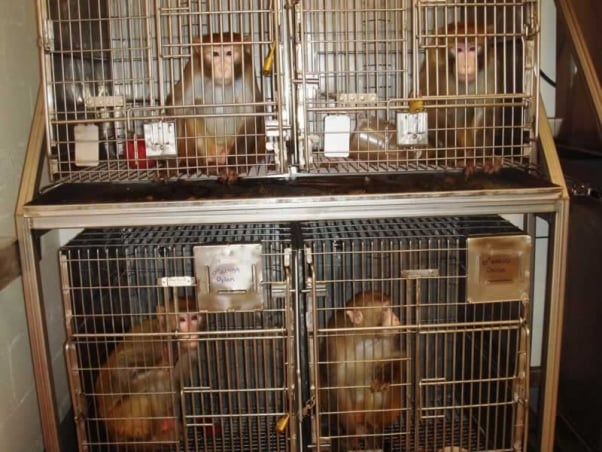PETA Challenges UNMC and Creighton to Make Good on Pledge to Reduce or Replace Animals in Experiments
For Immediate Release:
December 9, 2024
Contact:
Tasgola Bruner 202-483-7382
The numbers of animals being experimented on are going up, not down, and they are enormous. Today, PETA threw down a gauntlet at the feet of the University of Nebraska Medical Center (UNMC) and Creighton University, challenging the schools to show proof that they are honoring their long, publicly-touted commitment to the “3Rs” principle of “replacing, reducing, and refining” the use of animals in experiments.
In letters to UNMC Vice Chancellor Kenneth W. Bayles and Creighton University Vice Provost Juliane K. Strauss-Soukup, PETA reveals that despite the schools’ assurance to federal authorities that they would adhere to the 3Rs principle in their laboratories, UNMC used more than 37,000 mice, rats, frogs, fishes, and birds in experiments, according to a recent inventory, as well as dozens of hamsters, rabbits, monkeys, and pigs, while Creighton University used more than 2,500 mice, rabbits, fishes, and frogs in experiments, as well as dozens of rabbits, hamsters, and guinea pigs.

The 3Rs refer to reducing animal use, replacing animals with animal-free methods, and refining experiments on animals to be less cruel. The concept was first published in 1959 and, as a theory, was enthusiastically embraced by animal experimenters worldwide, but UNMC and Creighton appear not to have put it into practice, as significant numbers of animals continue to be used in their laboratories. UNMC received over $98.6 million in taxpayer funding in 2023, while Creighton received over $8.5 million—and about half that money bankrolled experiments on animals. Among these, experimenters at UNMC repeatedly injected mice with tamoxifen, causing severe side effects such as rectal bleeding, hunched postures, and extreme lethargy before gassing them to death. Experimenters at Creighton subjected mice as young as 10 days old to extreme stress through a series of harmful procedures. These included placing the mice on hot plates, depriving them of food for 24 hours, confining them in cages that delivered painful foot shocks, and forcing them to swim in inescapable beakers of water to avoid drowning.
“For decades, the 3Rs principles of refine, reduce, and replace have been a convenient smokescreen for universities to hide behind—but their laboratories are prisons where sentient animals are deprived of a life, kept in metal boxes, and subjected to every foolish thing under the sun,” says PETA Vice President Dr. Alka Chandna. “We want officials at UNMC and Creighton to come clean, and if there’s a real plan in place, make it public now or stop pretending.”
Studies show that 90 percent of basic research, most of which involves animals, fails to lead to effective treatments for humans, while 95 percent of new drugs that test safe and effective in animals later fail in humans. According to a poll published earlier this year, 80 to 85 percent of U.S. residents think experiments on animals should be phased out and tax dollars spent on non-animal methods instead. PETA is pushing universities to transition to superior, non-animal research methods.
PETA—whose motto reads, in part, that “animals are not ours to experiment on”—points out that Every Animal Is Someone and offers free Empathy Kits for people who need a lesson in kindness. For more information, please visit PETA.org or follow the group on X, Facebook, or Instagram.


